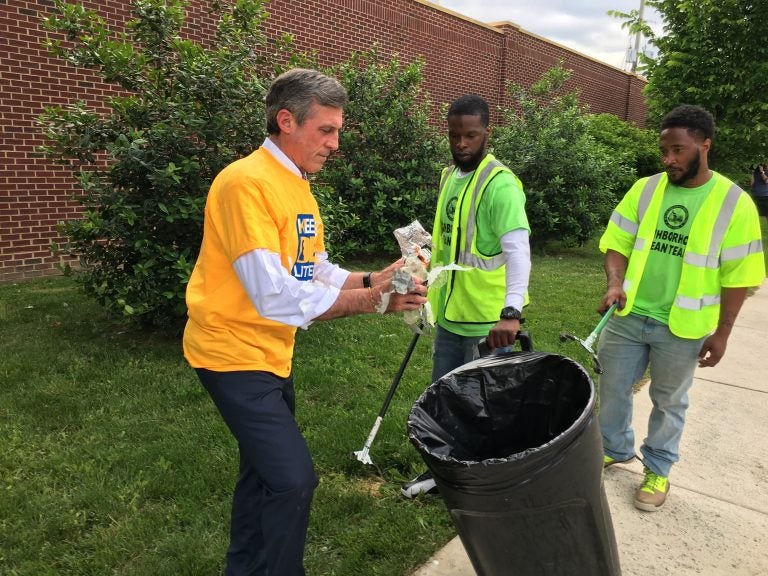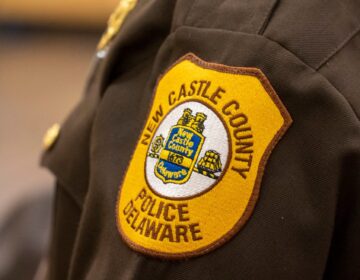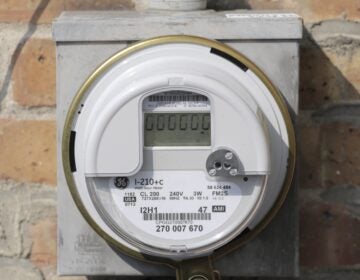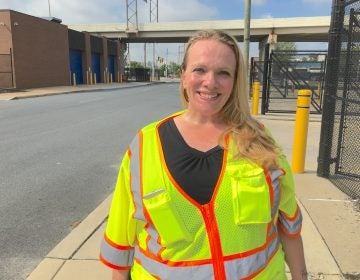Delaware launches anti-litter campaign to clean up First State
The Delaware anti-litter alliance joins towns throughout the state in the fight against trash.

Gov. John Carney picks up litter along Vandever Ave. in northeast Wilmington. (Mark Eichmann/WHYY)
Delaware street corners are littered with trash. From coffee cups tossed out of car windows to plastic bags swirling in the wind, it’s easy to find a trash can’s worth of litter at any intersection.
A 2018 study by the group “Keep Delaware Beautiful” found more than 6,000 pieces of trash for every mile of roadway surveyed. Most of that trash consisted of cigarette butts, plastic bags, fast food wrappers, cans and bottles.
It’s long been a source of aggravation for Gov. John Carney.
“It’s sends a really bad message to the visitors in our state,” he said. Now he’s gathered leaders of cities, towns and counties in Delaware to fight the litter.
“This is going to be a long-term effort, really, to change the ethic,” Carney said. “Let’s adopt the ethic that it’s unacceptable to throw litter, to roll down the window of your car and throw litter outside into the environment for somebody else to pick it up.”
To spread that message and do some of the cleanup work, town leaders have joined with nonprofit groups to form the Delaware Anti-Litter Alliance. The coalition aims to reduce trash blowing around the state by encouraging residents not to litter, pursuing anti-litter policies, and holding a cleanup event at least once a year.
“We love our state. We think it’s beautiful, we want people to come here and live and work, and so we need to do everything we can to keep it beautiful,” Carney said.
That work has already been happening in Wilmington. In 2017, Mayor Mike Purzycki launched the Beautiful City Initiative. That effort focused public works crews on cleaning the main thoroughfares into the city in the morning before rush hour. The initiative also relaunched the adopt-a-block program, with volunteers from neighborhood groups and businesses agreeing to clean an area once a month.
The program created a sense of neighborhood pride that drove the cleanup. “The secret sauce was that the people who were doing the work in the neighborhoods lived there, they cared about that community,” Purzycki said. “When they were picking something up off the ground, it was very personal.”
The Wilmington cleanup has been aided by former inmates through a re-entry program run by the Hope Commission. Former inmates who are considered a medium or high risk of reoffending after being released from prison are hired for about 25 hours a week to pick up trash.
“These guys are out Monday through Friday, early in the day, cleaning up sidewalks and street curbs, removing all litter they can find and just trying to keep this area of the city as clean as possible,” said the Hope Commission’s Haneef Salaam.
Those in the program also receive cognitive behavior therapy and workforce development training. The city program was recently expanded so it can continue all year round.
“It even gives our guys a greater opportunity to lock in with this maybe as a first job, a stepping stone job, to really solidify the rest of their future,” Salaam said.
WHYY is your source for fact-based, in-depth journalism and information. As a nonprofit organization, we rely on financial support from readers like you. Please give today.




